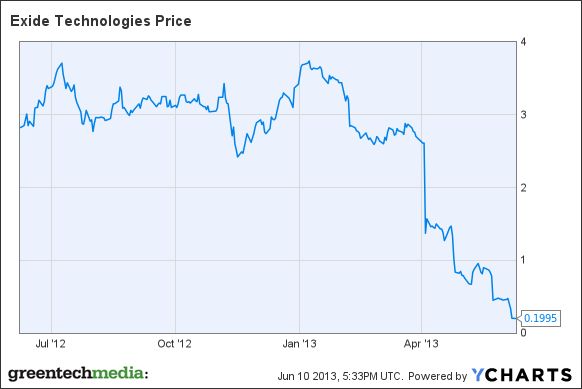Publicly traded Exide (XIDE), one of the world's largest makers and recyclers of lead-acid batteries, just filed for voluntary Chapter 11 proceedings. The filing applies only to the U.S. parent company.
Exide had 2012 revenue of more than $3 billion across the globe in the transportation and industrial energy markets.
But battery manufacturing is a difficult, high-capex, low-margin business and the competition is often a massive Asian conglomerate. So despite the billions in revenue, today the stock trades at $0.20 per share and the firm has a market capitalization of $16 million.
James Bolch, the CEO of the firm, said in a statement that the firm had "been burdened by a highly leveraged balance sheet which has limited our ability to competitively invest in our businesses. Recently, our profitability has been impacted by unprecedented increases in our product costs -- driven primarily by the market price of scrap lead in North America -- as well as operational challenges in the U.S. and Europe which we have been unable to fully offset. After a great deal of consideration, we concluded a restructuring of our balance sheet and our operations was the best path forward for the Company."
Exide defines its markets on its website: "Transportation markets include original-equipment and aftermarket automotive, heavy-duty truck, agricultural and marine applications, and new technologies for hybrid vehicles and automotive applications. Industrial markets include network power applications such as telecommunications systems, electric utilities, railroads, photovoltaic (solar-power related) and uninterruptible power supply (UPS), and motive-power applications including lift trucks, mining and other commercial vehicles."
There is a lesson here on the slim margins and fierce competition for startup aspirants in the battery technology business. Some firms such as Stem and Demand Energy are focused on the intelligence layer around the battery rather than the battery itself.
Competitors in the battery field include Johnson Controls (JCI) and GS Yuasa. Battery startups Imara and Firefly Energy have gone bankrupt. A123 Systems was purchased after having immense cash flow problems and going bankrupt. Boston-Power is another battery startup that's had to change its plans and move its operations to China.
Exide's financials in 2011 and 2012 (see below) look better than the first nine months of the company's fiscal 2013. Revenue for the first nine months of fiscal 2013 were $2.2 billion versus $2.3 billion for the previous fiscal year period, with 2013 losses of $135.8 million.
Exide does not plan any layoffs at this time.
